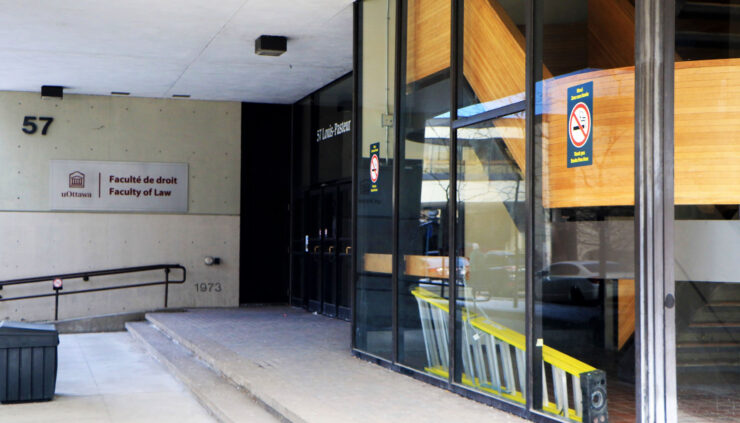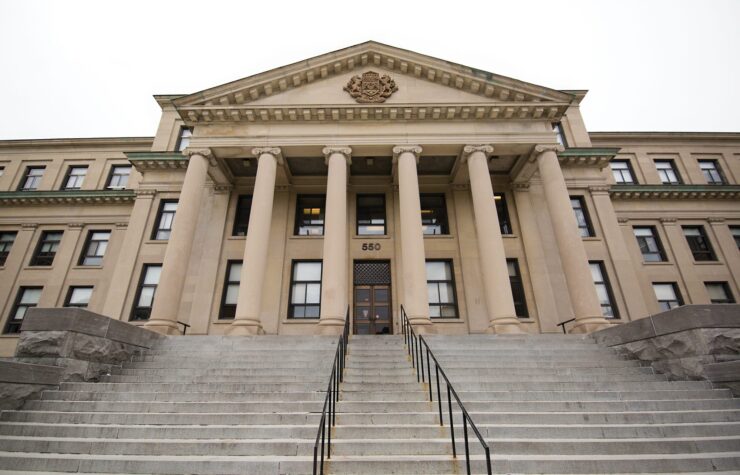Both demonstrations saw students rally outside Tabaret Hall
Content warning: Suicide
Students at the University of Ottawa organized two demonstrations in the span of four days earlier this month, with each rally calling on the administration to improve the school’s approach to addressing the mental health crisis.
On Feb. 28, one day after the administration hosted a town hall on mental health, a group of students equipped with signs containing messages such as “You just have to listen” stood outside of Tabaret Hall, before displaying the posters at the glass windows inside near president Jacques Frémont’s office.
“(The administration) is seeing the big picture, but what is causing the students to have all these challenges? There are a lack of services, but it’s more than that,” said Alexie Leclerc, a fourth-year health sciences student who organized the first demonstration.
Leclerc said that she decided to organize the event after receiving an email from the school in early February announcing the fifth student death in the past 10 months.
“Students were concerned about it on social media. It was telling me that this was unacceptable,” she said.
Leclerc acknowledged the efforts being made by the school in tackling the mental health crisis in the past few months, such as the creation of a mental health task force, but emphasized that a stigma still exists on campus.
“When you talk about mental health, it’s harder to get the help you need, and then people will tend to judge more,” she said. “We’re just starting to kind of understand it, talk about it.”
She also voiced the concerns of her friends, who she said have been met with insensitive comments from their professors after coming forward about their mental health concerns.
“They went to the doctor’s, got a doctor’s note, they bring it to their professor and they were kind of judged for it,” she said. “We’re in 2020 … you would think that they would be more understanding, but they don’t really understand.”
Leclerc then proposed that faculty members receive mental health sensitivity training.
“It’s sad because if your professors are telling you this, are you going to reach out for services? You feel like you’re lazy, or you feel like you’re not good enough,” she said.
In terms of what she would like to see change on campus, Leclerc said that she would like to see the school improve how they promote mental health services on campus.
“They’re sending a lot of emails with information about the mental health services on campus, but the way it’s communicated might not be the best. It might be at the end … personally, I’m not going to take time to read the whole email,” she said. “It should be an email specific to that … like once a month or once a semester at least, just about mental health services on campus.”
Three days later, the uOCollective 4 Mental Health — a student movement launched in December after the fourth student death of 2019 — organized a similar rally outside of Tabaret Hall on March 2, only this demonstration began with a march from the Sandy Hill Community Centre.
Angela Toubis, one of the co-founders of the collective, said that the demonstration was a response to several broken promises made by Frémont.
“One of them is that he promised us he would have another meeting (with us), and it wasn’t until we called him out at the town hall — which he didn’t attend — that he only emailed us a day later saying ‘let’s have another meeting,’ ” said Toubis.
Another promise Toubis said that Frémont has broken was when he assured a student at faculty of arts town hall that he would send out a formal apology to the community for allowing a Scientology linked anti-psychiatry exhibit to be displayed on campus for a week in January.
“At least give us a formal apology. We get it, give them the freedom of speech or whatever — which we don’t agree with — but you do you,” she said. “At least give us what we’re asking for. He said ‘OK.’ Never did it.”
Toubis said that students deserve another formal apology from both Frémont and Kevin Kee, the dean of the faculty of arts who is leading the task force, after the two were absent from the mental health town hall.
“I would love a formal apology for not being there, but is there even a point of asking? Is anyone surprised?” said Toubis.
She added that if the mental health system does improve this year, it’ll be because of the students who pushed for change, not from Frémont or the administration.
“The uOCollective has been in correspondence with the University of Toronto, planning a summit conference in Toronto (on March 14) for all universities and all colleges province-wide,” she said. “We’re going to talk about unique issues happening, what we can do, we’ve got speakers. It’s taken us students two months. Meanwhile, it’s taking Frémont how long?”
Read More:
- U of O students, profs confront administration on mental health at town hall
- Grad students highlight mental health concerns at GSAÉD roundtable
- U of O president acknowledges mental health ‘crisis’ in wake of student death
A non-comprehensive list of local mental health resources appears below…
On campus…
- University of Ottawa Health Services (UOHS), 100 Marie-Curie Private
- Offers counselling, psychiatric services, individual, couple or family therapy, access to psycho-educational groups and referrals to specialists off-campus
- Student Academic Success Service (SASS), 100 Marie-Curie Private
- Offers individual counselling, peer-counselling, workshops, online therapy and group counselling using new stepped model; referrals
- Faculty mentoring centres (locations differ by faculty)
- Specialized mentoring services catered to the needs of students in each faculty
Off campus…
- Mental health hotlines…
- Drugs and Alcohol Helpline: 1-866-531-2600
- Canada Suicide Prevention Service phone available 24/7: 1-833-456-4566
- Fem’aide: 1-877-336-2433
- Good2Talk: 1-866-925-5454
- Kids Help Phone: 1-800-668-6668 or text CONNECT to 686868
- Mental Health Crisis Line: 613-722-6914
- Distress Centre of Ottawa and Region: (613) 238-3311
- Ottawa Rape Crisis Centre: 613-562-2333
- Tel-Aide Outaouais: 613-741-6433
- Trans Life Line: 1-877-330-6366
- Walk-in counselling clinics (six Ottawa locations)…
- Somerset West Community Health Centre (55 Eccles Street)
- South-East Ottawa Community Health Centre (1355 Bank Street)
- Family Services Ottawa (312 Parkdale Avenue)
- Jewish Family Services of Ottawa (300-2255 Carling Avenue)
- Ottawa Community Immigrant Services Organization(959 Wellington St. W)
- CFS/SFC Ottawa (310 Olmstead Road)
- Community health and resource centres (13 in Ottawa)
- Carlington Community Health Centre (900 Merivale Road)
- Eastern Ottawa Resource Centre (215-1980 Ogilvie Road)
- Nepean, Rideau and Osgoode Community Resource Centre (1547 Merivale Road, Unit 240)
- Rideau-Rockcliffe Community Health Centre (225 Donald Street)
- Sandy Hill Community Health Centre (221 Nelson Street)
- South East Ottawa Community Health Centre (1355 Bank Street)
- Western Ottawa Community Resource Centre (2 MacNeil Court)
- Centretown Community Health Centre (420 Cooper Street)
- Lowertown Community Resource Centre (40 Cobourg Street)
- Orleans-Cumberland Community Health Centre (240 Centrum Boulevard)
- Pinecrest-Queensway Community Health Centre(1365 Richmond Road)
- Somerset West Community Health Centre (55 Eccles Street)
- Vanier Community Service Centre (270 Marier Avenue)
Warning signs of suicide include:
Talking about wanting to die
Looking for a way to kill oneself
Talking about feeling hopeless or having no purpose
Talking about feeling trapped or being in unbearable pain
Talking about being a burden to others
Increasing use of alcohol or drugs
Acting anxious, agitated, or recklessly
Sleeping too little or too much
Withdrawing or feeling isolated
Showing rage or talking about seeking revenge
Displaying extreme mood swings
The more of these signs a person shows, the greater the risk. If you suspect someone you know may be contemplating suicide, you should talk to them, according to the Canadian Association for Suicide Prevention.





